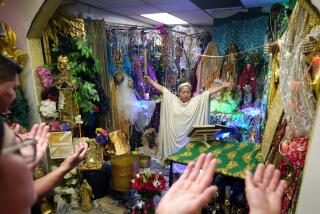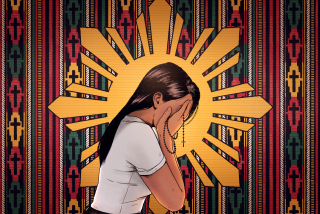Churches See Membership Soar In Cuba
- Share via
HAVANA — With religion now sanctioned by the state, Cubans are returning to the church in numbers unseen since the 1959 revolution.
Long-suffering priests and ministers are witnessing the phenomenon with delight, welcoming back prodigal sons and daughters and baptizing new believers by the thousands nationwide.
The religious resurgence holds profound implications for Cuba, expanding the influence of church leaders over the island’s 10.8 million inhabitants even as Fidel Castro’s Communist regime struggles to survive without Soviet economic and political sponsorship.
New adherents are flocking to a variety of faiths and denominations, from Roman Catholicism to Protestant evangelism to Santeria, the slave-rooted folk creed that blends Catholic and African tribal beliefs.
A dramatic example was supplied by recent, heavily attended Masses and processions commemorating the country’s Catholic patroness, a likeness of the Virgin Mary known as Our Lady of Charity.
“Yes, I believe!” thousands of Cubans shouted in chorus, over and over, during a homily by the country’s archbishop, Jaime Ortega, in a packed and sweltering Old Havana cathedral.
Bystanders called it the biggest turnout since before Castro took power 33 years ago, launching a fierce campaign of religious suppression.
Ortega proudly announced that 35,000 Catholics were baptized last year in Cuba, compared with 17,000 a decade ago. He said they include teen-agers and young married couples who shied away from the church for many years.
While studiously avoiding any direct reference to politics, Ortega defended religion against the Marxist critique.
“Religion is not a myth. It is not something primitive,” he declared in his homily.
A strained and wary relationship persists between Castro’s regime and most religious leaders, especially those of the traditional Roman Catholic church. Castro and Ortega are considered bitter enemies. The state closely monitors and circumscribes church activities.
But a partial thaw is evident. The government has warmed to some Protestant ministers, and Castro himself has admitted that trying to create an atheist Cuba may have been a mistake. In July, his National Assembly ended official discrimination against worshipers.
Now party members speak of church-state collaboration.
Speaking privately, a party official in central Cienfuegos province said religious groups were helping in state-backed social programs at a community level. Some local and international church organizations are shipping in medicine and other aid, helping solve severe shortages spawned by the loss of Soviet bloc trade and aid.
The new official attitude is reflected throughout society. Bible sales are booming, and state-run tourist stores sell devotional postcards. Once-taboo allusions to religion abound in local art and music.
“There are those who say their belief has ceased, but they slip out before dawn to meet a priest,” sings a Cuban musician, Adalberto Ysuson, in a popular new song.
Angel Perez, a Catholic priest in the dockside neighborhood of Regla, said four former Communists have shown up at his church in the previous two weeks.
“They had left the party and, looking for something else, they came here,” he said.
Perez, 76, a priest for a half-century, said he especially rejoices in seeing the old faces.
“I’ve known many of these people their whole lives. I saw them moving away from the church, and now they are coming back.”
More to Read
Sign up for Essential California
The most important California stories and recommendations in your inbox every morning.
You may occasionally receive promotional content from the Los Angeles Times.










